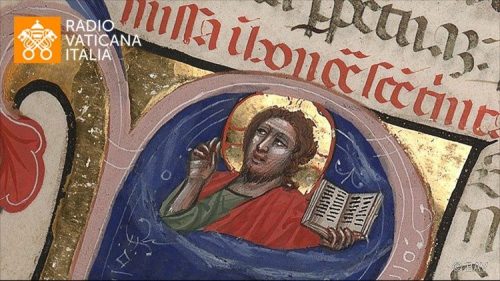READING OF THE DAY
A Reading from the Letter to the Hebrews
HEB 1:1-6
Brothers and sisters:
In times past, God spoke in partial and various ways
to our ancestors through the prophets;
in these last days, he spoke to us through the Son,
whom he made heir of all things
and through whom he created the universe,
who is the refulgence of his glory,
the very imprint of his being,
and who sustains all things by his mighty word.
When he had accomplished purification from sins,
he took his seat at the right hand of the Majesty on high,
as far superior to the angels
as the name he has inherited is more excellent than theirs.
For to which of the angels did God ever say:
You are my Son; this day I have begotten you?
Or again:
I will be a father to him, and he shall be a Son to me?
And again, when he leads the first born into the world, he says:
Let all the angels of God worship him.
GOSPEL OF THE DAY
From the Gospel according to Mark
MK 1:14-20
After John had been arrested,
Jesus came to Galilee proclaiming the Gospel of God:
“This is the time of fulfillment.
The Kingdom of God is at hand.
Repent, and believe in the Gospel.”
As he passed by the Sea of Galilee,
he saw Simon and his brother Andrew casting their nets into the sea;
they were fishermen.
Jesus said to them,
“Come after me, and I will make you fishers of men.”
Then they left their nets and followed him.
He walked along a little farther
and saw James, the son of Zebedee, and his brother John.
They too were in a boat mending their nets.
Then he called them.
So they left their father Zebedee in the boat
along with the hired men and followed him.
WORDS OF THE HOLY FATHER
Dear Brothers and Sisters, Good morning!
Today’s Gospel passage (cf. Mt 4:12-23) recounts the beginning of Jesus’ preaching in Galilee. He leaves Nazareth, a village in the mountains, and settles in Capernaum, an important centre on the lakeshore, inhabited largely by pagans, a crossroads between the Mediterranean and the Mesopotamian inland. This choice indicates that the beneficiaries of his preaching are not only his compatriots, but those who arrive in the cosmopolitan “Galilee of the Gentiles” (v. 15, cf. Is 9:1): that’s what it was called. Seen from the capital Jerusalem, that land is geographically peripheral and religiously impure because it was full of pagans, having mixed with those who did not belong to Israel. Great things were not expected from Galilee for the history of salvation. Instead, right from there — precisely from there — radiated that “light” on which we meditated in recent Sundays: the light of Christ. It radiated right from the periphery.
Jesus’ message reiterates that of the Baptist, announcing the “kingdom of heaven” (v. 17). This kingdom does not involve the establishment of a new political power, but the fulfillment of the Covenant between God and his people, which inaugurates a season of peace and justice. To secure this covenant pact with God, each one is called to convert, transforming his or her way of thinking and living. This is important: converting is not only changing the way of life but also the way of thinking. It is a transformation of thought. It is not a matter of changing clothing, but habits! What differentiates Jesus from John the Baptist is the way and manner. Jesus chooses to be an itinerant prophet. He doesn’t stay and await people, but goes to encounter them. Jesus is always on the road! His first missionary appearances take place along the lake of Galilee, in contact with the multitude, in particular with the fishermen. There Jesus does not only proclaim the coming of the kingdom of God, but seeks companions to join in his salvific mission. In this very place he meets two pairs of brothers: Simon and Andrew, James and John. He calls them, saying: “Follow me, and I will make you fishers of men” (v. 19). The call reaches them in the middle of their daily activity: the Lord reveals himself to us not in an extraordinary or impressive way, but in the everyday circumstances of our life. There we must discover the Lord; and there he reveals himself, makes his love felt in our heart; and there — with this dialogue with him in the everyday circumstances of life — he changes our heart. The response of the four fishermen is immediate and willing: “Immediately they left their nets and followed him” (v. 20). We know, in fact, that they were disciples of the Baptist and that, thanks to his witness, they had already begun to believe in Jesus as the Messiah (cf. Jn 1:35-42).
We, today’s Christians, have the joy of proclaiming and witnessing to our faith because there was that first announcement, because there were those humble and courageous men who responded generously to Jesus’ call. On the shores of the lake, in an inconceivable land, the first community of disciples of Christ was born. May the knowledge of these beginnings give rise in us to the desire to bear Jesus’ word, love and tenderness in every context, even the most difficult and resistant. To carry the Word to all the peripheries! All the spaces of human living are soil on which to cast the seeds of the Gospel, so they may bear the fruit of salvation.
May the Virgin Mary help us with her maternal intercession to respond joyfully to Jesus’ call, and to place ourselves at the service of the Kingdom of God.
(Angelus, 22 January 2017)

